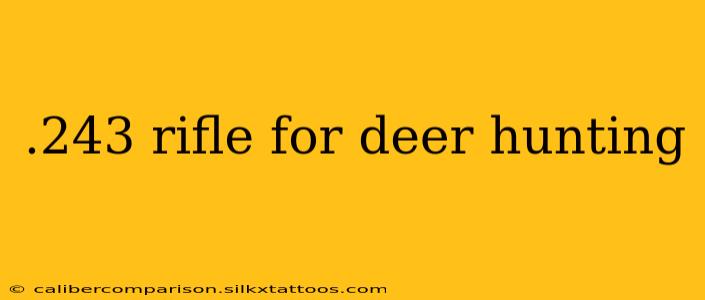The .243 Winchester remains a popular choice for deer hunting, prized for its accuracy, manageable recoil, and flat trajectory. This comprehensive guide will delve into the suitability of the .243 for deer hunting, exploring its strengths and weaknesses, ammunition considerations, and ethical hunting practices.
Is the .243 Winchester Right for Deer Hunting?
The answer is a resounding "yes," but with important caveats. The .243's effectiveness hinges heavily on shot placement and proper bullet selection. Its relatively lower recoil makes it ideal for novice hunters or those seeking a less punishing experience, while still delivering sufficient stopping power for ethical harvests.
Advantages of the .243 for Deer Hunting:
- Manageable Recoil: Its lighter recoil allows for quicker follow-up shots and improved accuracy, especially beneficial for younger or less experienced hunters.
- Flat Trajectory: The .243 boasts a flatter trajectory than many other calibers, meaning less bullet drop at longer ranges, resulting in more accurate shots.
- Accuracy: Known for its accuracy, the .243 allows for precise shot placement, crucial for a clean kill.
- Availability of Ammunition: Finding .243 Winchester ammunition is generally easy and affordable.
- Versatility: Suitable for a range of deer sizes, from smaller whitetails to larger mule deer (with proper bullet selection and shot placement).
Disadvantages of the .243 for Deer Hunting:
- Energy at Longer Ranges: While its flat trajectory is an advantage, the .243's energy begins to drop off more significantly at longer distances compared to some larger calibers. Ethical shot distances should be carefully considered.
- Bullet Selection: Choosing the right bullet is critical for effective deer hunting. Poor bullet choice can lead to inadequate penetration and less-than-ideal results. Look for bullets designed for deer hunting, featuring adequate weight and expansion characteristics.
- Not Ideal for Extremely Large Deer: While suitable for many deer species, the .243 might not be the best choice for consistently hunting exceptionally large deer or animals with thick hides. Larger calibers may offer more stopping power in these scenarios.
Choosing the Right Ammunition for Deer Hunting with a .243
Ammunition selection is paramount for a successful and ethical hunt. Factors to consider include:
- Bullet Weight: Generally, bullet weights between 80 and 100 grains are suitable for deer hunting with a .243. Heavier bullets offer greater penetration, while lighter bullets often have a flatter trajectory.
- Bullet Construction: Look for bullets designed for expansion at hunting velocities. Common choices include bonded, core-lokt, and controlled expansion bullets. These bullets are engineered to retain their weight and integrity while expanding for increased energy transfer.
- Velocity: Higher velocity generally means a flatter trajectory and better energy retention at longer ranges. However, this is a factor to balance with the weight and construction of the bullet.
Note: Always check your state's regulations regarding legal ammunition for deer hunting.
Ethical Hunting Considerations with the .243
Ethical hunting practices should always be prioritized. This involves:
- Shot Placement: Accurate shot placement is critical for a quick, humane kill. Aim for vital organs, such as the heart and lungs.
- Shot Distance: Be aware of your effective range and avoid taking long shots where bullet energy and accuracy are compromised.
- Tracking: If a shot is not immediately fatal, be prepared to track the animal and ensure a swift and humane outcome. This may involve seeking assistance from experienced hunters or game wardens.
- Proper Equipment: Ensure your rifle is properly sighted in and you have all the necessary equipment for a safe and successful hunt.
Conclusion
The .243 Winchester is a capable and versatile cartridge well-suited for deer hunting, particularly for those seeking a less-recoil rifle with good accuracy and a flat trajectory. However, responsible gun ownership and ethical hunting practices remain paramount. Careful selection of ammunition, understanding of effective range limitations, and precise shot placement are crucial factors in ensuring a clean, ethical harvest. Remember to always practice safe gun handling techniques and adhere to all relevant hunting regulations.

